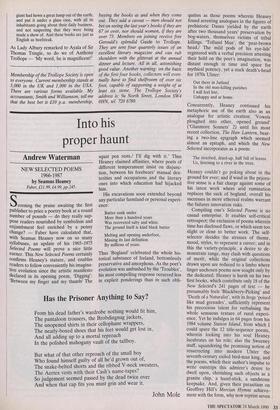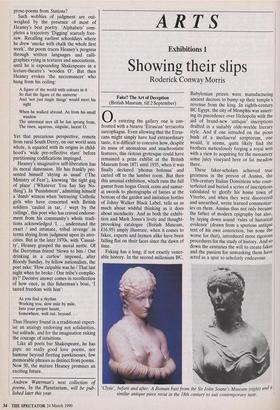Into his proper haunt
Andrew Waterman
NEW SELECTED POEMS 1966-1987 by Seamus Heaney Faber, £11.99, £4.99, pp.245.
Scorning the praise awaiting the first publisher to price a poetry book at a round number of pounds — do they really sup- pose readers nourished by symbolism and enjambment feel enriched by a penny change? — Faber have calculated that, with Seamus Heaney now on so many syllabuses, an update of his 1965-1975 Selected Poems will prove a nice little earner. This New Selected Poems certainly confirms Heaney's stature, and enables readers to follow conveniently his imagina- tive evolution since the artistic manifesto declared in its opening poem, 'Digging': Between my finger and my thumb/ The squat pen rests./ I'll dig with it.' Thus Heaney claimed affinities, where poets of different temperament insist on disjunc- tion, between his forebears' manual dex- terities and occupations and the literary ones into which education had hijacked him.
His excavations soon extended beyond any particular farmland or personal experi- ence:
Butter sunk under More than a hundred years Was recovered salty and white.
The ground itself is kind black butter Melting and opening underfoot, Missing its last definition By millions of years.
Thus 'Bogland' celebrated the whole his- torical substance of Ireland, bottomlessly preservative and amorphous. As the poet's evolution was ambushed by the 'Troubles', his most compelling response occurred less in explicit ponderings than in such obli- quities as those poems wherein Heaney found arresting analogues in the figures of prehistoric Danes yielded by the earth after two thousand years' preservation by bog-waters, themselves victims of tribal killings. `Tollund Man', the 'peat-brown head,/ The mild pods of his eye-lids' registered with a verbal precision attesting their hold on the poet's imagination, was distant enough in time and space for mythical potency, yet a stark death's-head for 1970s Ulster:
Out there in Jutland In the old man-killing parishes I will feel lost, Unhappy and at home.
Concurrently, Heaney continued his metaphoric use of the earth also as an analogue for artistic creation: 'Vowels ploughed into other, opened ground' (`Glanmore Sonnets' 2) until his most recent collection, The Haw Lantern, bear- ing a two-line epigraph which seemed almost an epitaph, and which the New Selected incorporates as a poem:
The riverbed, dried-up, half full of leaves. Us, listening to a river in the trees.
Heaney couldn't go poking about in the ground for ever; and if wind in the pejora- tive sense is a fair charge against some of his latest work where arid rumination replaces the suck of bogland, overall his successes in more ethereal realms warrant the failures innovation risks.
Compiling one's Selected Poems is no casual enterprise. It enables self-critical retrospect; the exclusion of poems wherein time has disclosed flaws, or which seem too slight or close to better work. The self- selector decides the stresses of theme, mood, styles, to represent a career; and in this the variety-principle, a desire to de- monstrate range, may clash with questions of merit, while the original collections drawn upon are reduced to a limbo where linger unchosen poems now sought only by the dedicated. Heaney is harsh on his two first books, which contribute only 18 of the New Selected's 241 pages of text — he presumably feels 'Blackberry-Picking' and `Death of a Naturalist', with its frogs 'poised like mud grenades', sufficiently represent his precocious talent for verbalising the whole sensuous texture of rural experi- ence. Yet he indulges in 64 pages from his 1984 volume Station Island, from which I could spare the 12 title-sequence poems, wherein looking into his soul Heaney lucubrates on his role; also the Sweeney stuff, squandering the promising notion of resurrecting into modern Ulster the seventh-century exiled bird-man king, and the poems, which their author's impulse to write outstrips this admirer's desire to dwell upon, cherishing such objects as a granite chip, a hazel-stick, a sandstone keepsake. And, given their parasitism on Geoffrey Hill's Mercian Hymns achieve- ment with the form, why now reprint seven prose-poems from Stations?
Such wobbles of judgment are out- weighed by the presence of most of Heaney's best poetry. 'Alphabets' com- pletes a trajectory 'Digging' scarcely fore- saw. Recalling earliest schooldays where he drew 'smoke with chalk the whole first week', the poem traces Heaney's progress through written languages and calli- graphies vying in textures and associations, until he is expounding Shakespeare in a lecture-theatre's 'wooden 0'. But then Heaney evokes 'the necromancer' who hung from his ceiling: A figure of the world with colours in it So that the figure of the universe
And 'not just single things' would meet his sight When he walked abroad. As from his small window The astronaut sees all he has sprung from, The risen, aqueous, singular, lucent 0.
Yet that precarious perspective, remote from rural South Derry, on our world seen whole, is equated with its origins in child- hood's `wide pre-reflective stare' before partitioning codifications impinged.
Heaney's imaginative self-liberation has its moral dimension. He has frankly pre- sented himself `shying as usual' (`The Ministry of Fear'), knowing 'the tight gag of place' (Whatever You Say Say No- thing'). In Punishment', admitting himself a `dumb' witness when 'betraying' Catholic girls who have consorted with British soldiers `cauled in tar, I wept by the railings', this poet who has craved endorse- ment from his community's whole tradi- tions acknowledged `I. . . understand the exact / and intimate, tribal revenge' in terms shying from judgment upon its atro- cities. But in the later 1970s, with 'Casual- ty', Heaney grasped the moral nettle. Of the Derryman friend 'blown to bits / Out drinking in a curfew' imposed, after Bloody Sunday, by fellow nationalists, the poet asks: 'How culpable was he / That last night when he broke / Our tribe's complic- ity?' Decisive answer comes in recollection of how once, in this fisherman's boat, 'I tasted freedom with him':
As you find a rhythm Working you, slow mile by mile, Into your proper haunt, Somewhere, well out, beyond.. .
Thus Heaney found in a traditional expert- ise an analogy endorsing not solidarities, but solitude, and for the imagination risking the courage of intuitions.
Like all poets bar Shakespeare, he has gaps: no really good love poems, nor humour beyond fleeting pawkinesses, few memorable phrases as distinct from poems. Now 50, the mature Heaney promises an exciting future.
Andrew Waterman's next collection of poems, In the Planetarium, will be pub- lished later this year.



















































 Previous page
Previous page